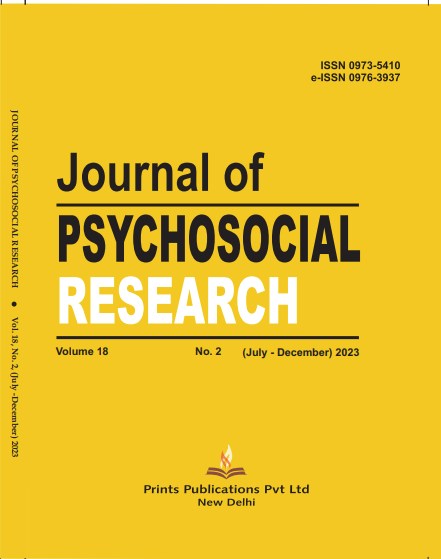Journal of Psychosocial Research
Current Volume: 20 (2025 )
ISSN: 0973-5410
e-ISSN: 0976-3937
Periodicity: Half-Yearly
Month(s) of Publication: June & December
Subject: Psychology
DOI: 10.32381/JPR
Coping Resources of Young People Experiencing COVID-19 Second Wave, in India: A Preliminary Study
By : Shilpa Ashok Pandit, Aatman Vaidya, Aangi Shah, Eshva Shah, Isha Iyer, Jhalak Golani, Kirti Pishe, Mantasha Guliwala, Shrishti Maheshwari and Tanishqua Dave
Page No: 189-199
Abstract:
The purpose of the student-led research study was to understand the experiences of COVID-19 in the second wave in terms of mental health and coping with loss and grief. To address the research questions, an exploratory survey tool was constructed, which documented the physiological and psychological experiences specific to anxiety, grief, panic, and distress through semi-structured schedules converted into google forms. The students were guided to construct the semi-structured questionnaire and the tool was translated and back-translated into regional languages of Gujarati, Marathi, Hindi, Malayalam, and Tamil. Given the lockdown, the data collection was carried out through telephonic and online interviews. Data collection was limited primarily to a youth population due to digital access being most available to youth (overall n = 203). Three key results are discussed. Firstly, data shows that the youth sample showed a clear preference for action readiness, even in the light of fear and distress due to the COVID-19 second wave. Females seemed to prefer a problem-solving coping pattern, but overall, the sample preferred to look at ‘what they could do’ in light of the fear and other distressing emotions. Second, given the age profile, the data showed that 50% of the sampled participants experienced moderate negative affect; 26% experienced low negative affect. Around 24% reported high negative affect in the aftermath of the COVID-19 second wave in May-July 2021. Third, data showed that participants reported two emotion focused coping strategies–through sharing more with the families and finding courage together. The coping strategies varied slightly according to the level of negative affect experienced. Given that the Government of India, in 2022, has initiated a telemental health program, with NIMHANS as a nodal agency, implications for policy and future research for mental health interventions leveraging technology are discussed.
Authors :
Shilpa Ashok Pandit
Associate Professor – School of Arts and Sciences, Ahmedabad University, Ahmedabad, Gujarat, India.
Aatman Vaidya, Aangi Shah, Eshva Shah, Isha Iyer, Jhalak Golani, Kirti Pishe, Mantasha Guliwala, Shrishti Maheshwari and Tanishqua Dave
Students – Ahmedabad University, Ahmedabad, Gujarat, India
DOI: https://doi.org/10.32381/JPR.2022.17.01.16





